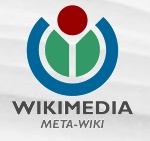As a frequent consulter, but not an editor, of Wikipedia, I’ve often wondered about what exactly goes on among the core contributors. A few clues can be found in the revision histories, but on a whole these are hard to read, internal work documents meant more for those actually getting their hands dirty in the business of writing and editing. Like choreographic notation, they may record the steps, but to the untrained reader they give little sense of the look or feeling of the dance.
 But dig around elsewhere in Wikipedia’s sprawl, turn over a few rocks, and you will find squirming in the soil a rich ecosystem of communities, organizing committees, and rival factions. Most of these — the more formally organized ones at least — can be found on the “Meta-Wiki,” a site containing information and community plumbing for all Wikimedia Foundation projects, including Wikipedia.
But dig around elsewhere in Wikipedia’s sprawl, turn over a few rocks, and you will find squirming in the soil a rich ecosystem of communities, organizing committees, and rival factions. Most of these — the more formally organized ones at least — can be found on the “Meta-Wiki,” a site containing information and community plumbing for all Wikimedia Foundation projects, including Wikipedia.
I took a closer look at some of these so-called Metapedians and found them to be a varied, often contentious lot, representing a broad spectrum of philosophies asserting this or that truth about how Wikipedia should evolve, how it should be governed, and how its overall significance ought to be judged. The more prominent schools of thought are even championed by associations, complete with their own page, charter and loyal base of supporters. Although tending toward the tongue-in-cheek, these pages cannot help but convey how seriously the business of building the encyclopedia is taken, with three groups in particular providing, if not evidence of an emergent tri-party system, then at least a decent introduction to Wikipedia’s political culture, and some idea of how different Wikipedians might formulate policies for the writing and editing of articles.
On one extreme is The Association of Deletionist Wikipedians, a cantankerous collective that dreams (with considerable ideological overlap with another group, the Exclusionists) of a “big, strong, garbage-free Wikipedia.” These are the expungers, the pruners, the weeding-outers — doggedly on the lookout for filth, vandalism and general extraneousness. Deletionists favor “clear and relatively rigorous standards for accepting articles to the encyclopedia.” When you come across an article that has been flagged for cleanup or suspected inaccuracies, that may be the work of Deletionists. Some have even pushed for the development of Wiki Law that could provide clearly documented precedents to guide future vetting efforts. In addition, Deletionists see it as their job to “outpace rampant Inclusionism,” a rival school of thought across the metaphorical aisle: The Association of Inclusionist Wikipedians.
This group’s motto is “Salva veritate,” or “with truth preserved,” which in practice means: “change Wikipedia only when no knowledge would be lost as a result.” These are Wikipedia’s libertarians, its big-tenters, its stub-huggers. “Outpace and coordinate against rampant Deletionism” is one of their core directives.
A favorite phrase of inclusionists is “Wiki is not paper.” Because Wikipedia does not have the same space limitations as a paper encyclopedia, there is no need to restrict content in the same way that a Britannica must. It has also been suggested that no performance problems result from having many articles. Inclusionists claim that authors should take a more open-minded look at content criteria. Articles on people, places, and concepts of little note may be perfectly acceptable for Wikipedia in this view. Some inclusionists do not see a problem with including pages which give a factual description of every last person on the planet.
(Even poor old Bob Aspromonte.)
Then along come the Mergist Wikipedians. The moderates, the middle-grounders, the bipartisans. The Mergists regard it their mission to reconcile the two extremes — to “outpace rampant Inclusionism and Deletionism.” As their eminently sensible charter explains:
The AMW believes that while some information is notable and encyclopedic and therefore has a place on Wikipedia, much of it is not notable enough to warrant its own article and is therefore best merged. In this sense we are similar to Inclusionists, as we believe in the preservation of information and knowledge, but share traits with Deletionists as we disagree with the rampant creation of new articles for topics that could easily be covered elsewhere.
For some, however, there can be no middle ground. One is either a Deletionist or and Inclusionist, it’s as simple as that. To these hardliners, the mergists are referred to dismissively as “delusionists.”
There are still other, less organized, ideological subdivisions. Immediatism focuses on “the immediate value of Wikipedia,” and so are terribly concerned with the quality — today — of its information, the neatness of its appearance, and its general level of professionalism and polish. When a story in the news draws public attention to some embarrassing error — the Seigenthaler episode, for instance — the Immediatists wince and immediately set about correcting it. Eventualism, by contrast, is more concerned with Wikipedia in the long run — its grand destiny — trusting that wrinkles will be ironed out, gaps repaired. All in good time.
How much impact these factions have on the overall growth and governance of Wikipedia is hard to say. But as a description of the major currents of thought that go into the building of this juggernaut, they are quite revealing. It’s nice that people have taken the time to articulate these positions, and that they have done so with humor, lending texture and color to what at first glance might appear to be an undifferentiated mob.
